Garden screening ideas to help you create a private outdoor space
Outdoor spaces are sacred, especially in the warmer months of the year when nothing feels better than sitting in your garden with a cool drink. Whether you want to sunbathe, host dinner parties, or create the perfect shaded reading spot, nobody likes to feel like they’re being watched.
That’s why garden privacy screens are a must have for anyone whose garden isn’t completely secluded from other properties and outdoor spaces. In this blog, we cover a range of different garden screening ideas that can help you create a private space this summer.
And, when you’re ready to get started, speak to a skilled garden landscaping specialist or fencing contractor to request a quote.
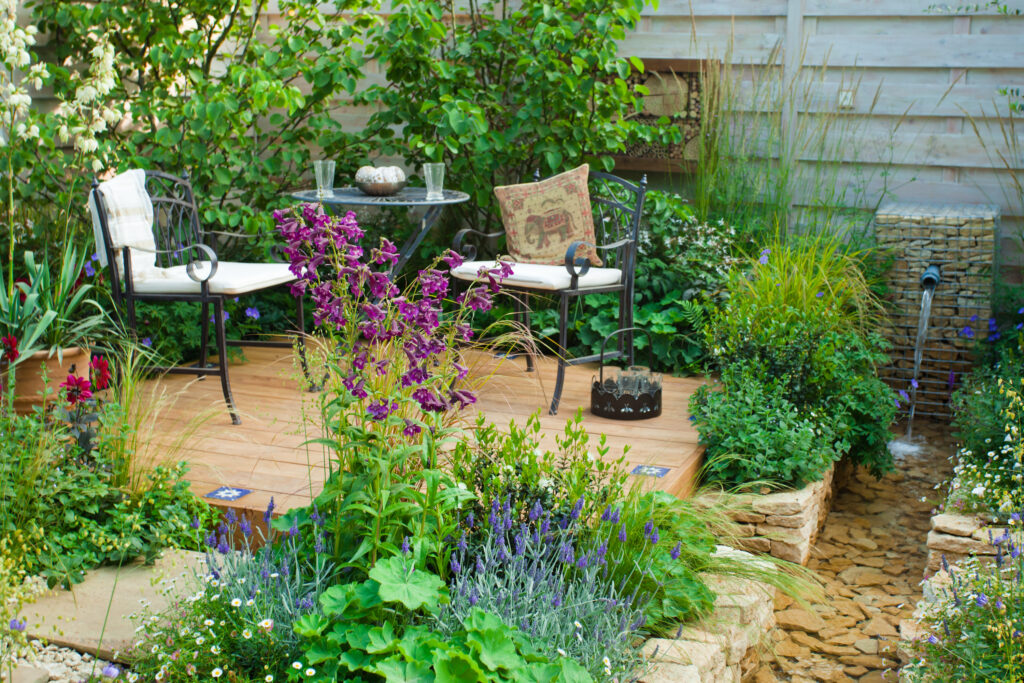
How can I screen my garden from neighbours?
Want a bit more privacy in your garden? Creating a more enclosed, protected space is super easy to do, and the good news is that you have plenty of options to choose from! Here are a few of the top privacy screen options available at the moment:
- A garden fence – the most common way to create privacy, garden fences come in a range of materials (like wood, metal, or vinyl) and can be decorated with climbing plants or trellis panels. Garden fences obstruct direct line of sight and can be installed to strategically block the view from certain angles. Make sure the height and placement of your fence follows local regulations and planning permission rules. Read our garden fence ownership guide to find out more.
- Hedges – you could also plant a garden hedge around the boundary of your garden. Hedges provide a natural privacy screen that can be grown to your desired height. The most popular hedge options in the UK include beech, privet, yew and laurel.
- Garden structures – This includes pergolas, sheds, summer houses, gazebos, arbours, or any other structure that can create a secluded area that blocks the view into your garden. To make them even more private, you can then add curtain, screening panels, lattices and other privacy measures to your structure once you’ve installed it. Read our planning permission guide to ensure you are aware of relevant rules and regulations.
- Screening plants – certain climbing plants grow tall and dense, making them great screening options that can add a natural privacy feature. These include evergreen shrubs like Viburnum or Photinia, bamboo, ornamental grass and conifers. Climbing plants such as ivy, honeysuckle, climbing roses and clematis are also a great way to cover a wall or fence to create a natural, living screen.
- Privacy screens – you can also buy ready-made privacy screens/panels and fence screening, all of which are easy to install and position wherever you need them. They come in a range of materials such as metal, composite or wood.
Make sure you consult your neighbours before you make changes to any shared boundaries. For more on avoiding boundary disputes, check out our neighbour disputes boundary blog.
And if you’re ready to get started, speak to a skilled garden landscaping specialist or fencing contractor in your local area.
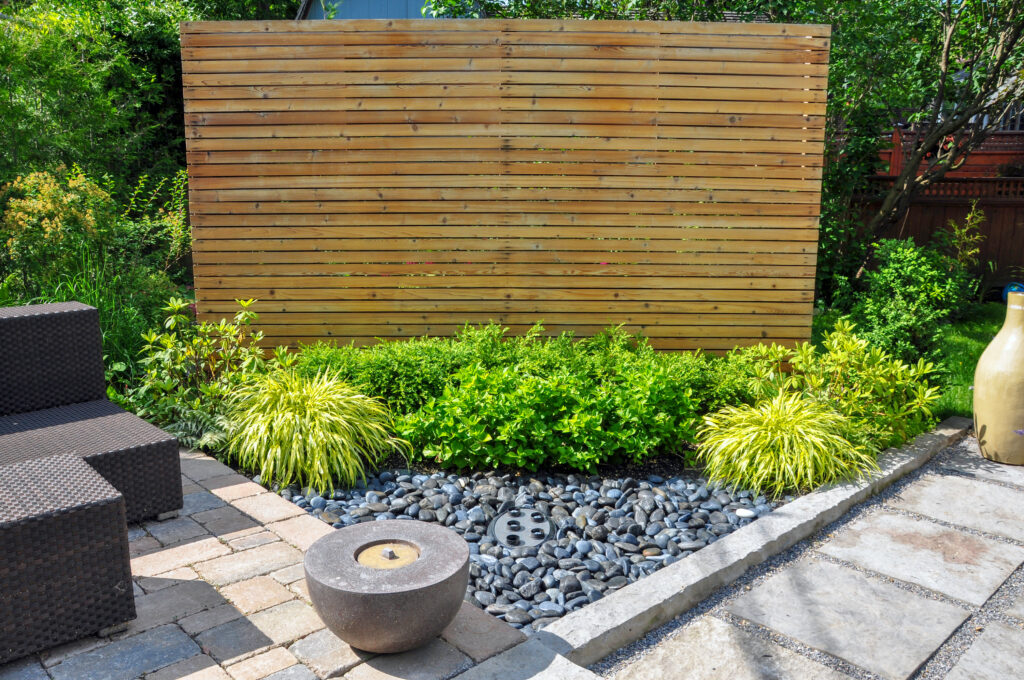
What is the best screening for gardens?
You might be wondering, is a garden shed a better choice than fence panels? Should I use bamboo screening or flowering hedges? Here is a breakdown of the pros and cons of some of the most popular privacy screening options, to help you decide which you should get for your garden:
| Type of garden privacy screen | Pros | Cons |
| Fence screening | – a physical barrier that provides very solid privacy – lots of materials and styles available to choose from – highly customisable to suit the aesthetics of your garden | – can sometimes create a closed-off feeling – requires periodic maintenance, cleaning and painting |
| Hedging | – offers a natural option that blends in well with your garden – can be trimmed and shaped to fit the desired height and size – can grow with visually appealing and scented flower options | – hedges take time to grow/create the privacy screen, unless purchased fully grown (which can be expensive) – require regular pruning and maintenance as well as regular watering, fertilising, and pest control |
| Screening plants | – visually interesting natural screen that create texture and add colour – some options grow fruits or flowers that are attractive and tasty, making them a natural garden decor choice – can be planted in specific places, making them versatile in blocking out specific views – a space saving option when trained along a wall or fence | – screening plants require regular pruning to control growth and to maintain the desired density – you have to train plants to make sure they grow in the right way – plants take time to grow and create the screen can grow out of hand and onto neighbouring properties if not looked after properly |
| Garden structures | – versatile, lots of options to choose from (sheds, summer houses, pergolas, etc) – highly customisable and can create a focal point in your garden – very flexible in terms of where you can place yours, so you can position it to block a certain view and maximise privacy | – can be high maintenance in terms of cleaning and repairs, especially wooden structures that need to be treated periodically – sometimes require planning permission to build (see planning permission guide for more information) – can be more expensive than other garden privacy options |
| Garden privacy screens | – easy to install and to move around – plenty of materials to choose from (including wood, metal, composite) to match different garden aesthetics – can be combined with plants to create layered privacy solutions | – Can block sunlight and airflow, creating a closed-off feel – not as aesthetic (less of a natural garden feel), though you can grow climbing plants on your screening – requires regular cleaning and maintenance to prevent dirt build up and damage |
Your choice will depend on your preferences and needs, as well as the size of your garden. Which plant species, fencing material or garden structure you get will of course impact on how much it will cost to install and maintain it (for instance wooden structures are higher maintenance, as are certain types of plants), so keep this in mind as well when choosing your privacy option.
Want to give your garden a bit of tender loving care? Hire a gardener to do some routine garden maintenance jobs around your outdoor spaces, just in time for summer party season…
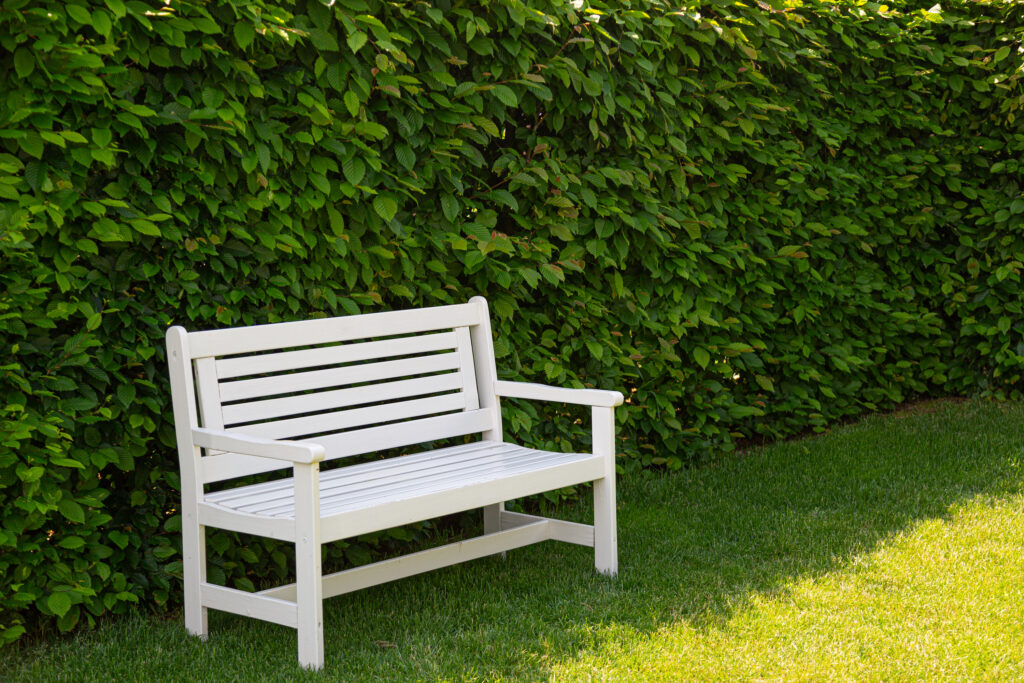
Do you need planning permission for a privacy screen?
Whether or not you’ll need planning permission to set up privacy screens and other privacy features in your outdoor garden spaces mostly depends on whether your project falls under permitted development rights.
Read our planning permission guide to find out more about whether or not you’ll need to apply for permission or not, and the conditions and limitations you’ll need to stick to if you want to avoid applying for permission.
How can I make my garden more private on a budget?
Looking for cost-effective privacy features to help you block out the neighbours this summer? The below tips should help you out:
- Inexpensive but fast growing plants, shrubs or bamboo can act as a natural privacy screen. If you get them as saplings, they’ll be even cheaper to buy, though you’ll have to wait for them to grow before they start acting as a privacy barrier.
- Arrange the plants and pots you already have strategically to create privacy in specific areas of your garden. If you don’t have a lot of plants, buying some tall or bulky options might still be a more affordable option than investing in screens or outdoor structures.
- Look for second hand privacy screens made from more affordable materials like PVC, and browse online sales and online marketplaces for bargain prices.
- Outdoor curtains and other waterproof fabrics are a cheap and versatile option, as they can be hung up in plenty of different ways to block out unwanted views.
- Try your hand at a bit of DIY fencing by buying affordable wooden fence panels and putting them together yourself. Simple fencing designs are easy to construct – it could be a fun summer project that might save you some money too!
- Repurpose materials – look around your house for any unused furniture or extra materials from past projects that you could repurpose and attach to your fence or outdoor structure and turn into privacy screens.
If you’re making any alterations to a boundary you share with your neighbour, we recommend you speak to them first to avoid any disputes.
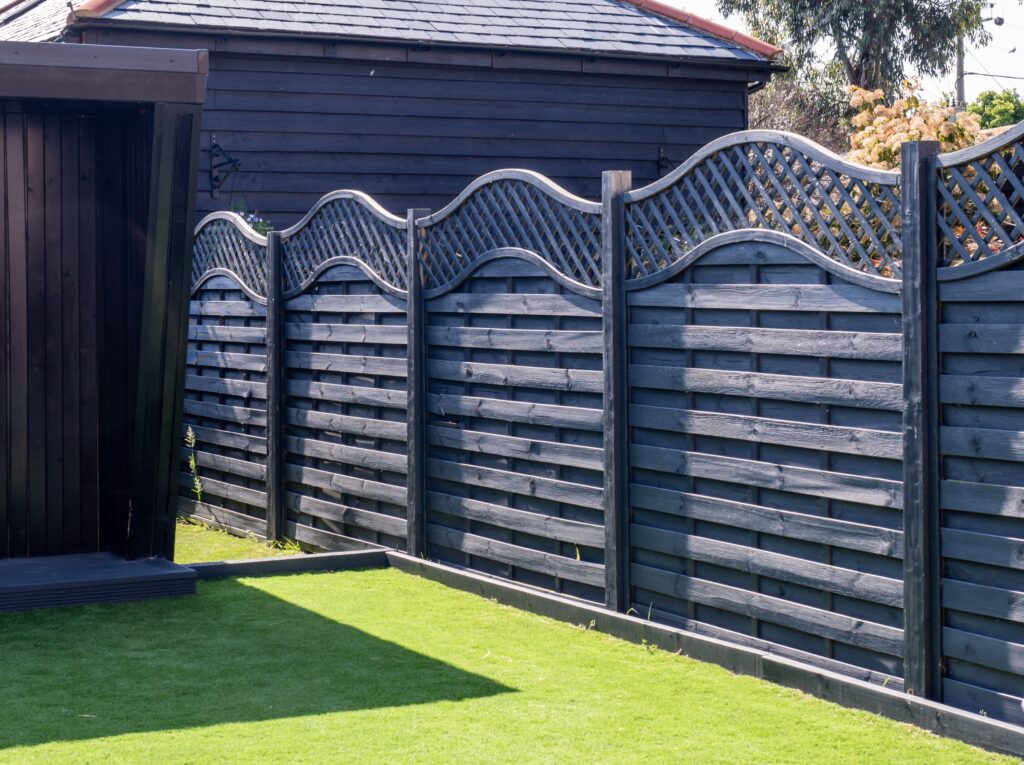
What is the difference between a fence and a privacy screen?
The main difference between fences and a privacy screens is their purpose. Fences establish boundaries and provide security. They contain children and pets and create a physical barrier between different gardens and houses.
On the other hand, privacy screens are installed to block certain views, and are designed to create secluded spaces within your garden. This means that they’re usually placed strategically, such as near seating or dining areas. They’re more flexible than fences, in that they’re easier to move or rearrange. They range from smaller, partial privacy screens to larger models that completely block the view into your garden.
What is the longest lasting privacy fence?
If you’re looking for a long-lasting privacy fence, the below options are known for being durable:
- Vinyl – vinyl is very durable and requires little maintenance. It’s resistant to warping, insects and rot, meaning that with little care your vinyl privacy fence can last you several decades. Plus, vinyl comes in a lot of different colours and styles, meaning there will definitely be an option that matches your garden’s aesthetic.
- Composite – made from a combination of recycled plastic and wood fibres, composite looks like wood but has the added benefit of being low maintenance and highly durable. Like vinyl, composite is also resistant to weather, rot and insect damage.
- Aluminium – highly durable, aluminium privacy fencing is also lightweight and resistant to rust. Aluminium does not rot or decay easily, making it suitable for rainy weather.
- Metal – steel or wrought iron fences are strong and long-lasting. They’re also resistant to insects, weather and rot, though they do require some maintenance to prevent them from rusting.
Whichever you choose, it’s always a good idea to ensure that your privacy fence is installed correctly, so that you can maximise the lifespan of your fence. Speak to a skilled fencer in your local area to request a quote.

How do I make my fence taller for privacy?
There are lots of ways you can make an existing fence taller in order to increase your garden’s privacy. For instance, you could:
- Get a fence topper or fence extension that attaches to your existing fence posts, adding height and privacy
- Attach lattice panels to your fence, which are both visually appealing and increase privacy. You can install lattice panels using nails or screws
- Install a trellis or panel in front of the fence and train plants to grow on and above the fence height, creating a natural privacy layer
- Plant tall shrubs or trees along the fence line to create a barrier (opt for fast-growing plants to quickly reach the height you’re looking for)
Whatever you choose, keep in mind that it’s very important that you check local regulations before you extend your garden fence, as height restrictions do apply in some areas of the UK. This means that you might have to apply for permission before you can complete the work. You can find out more here.
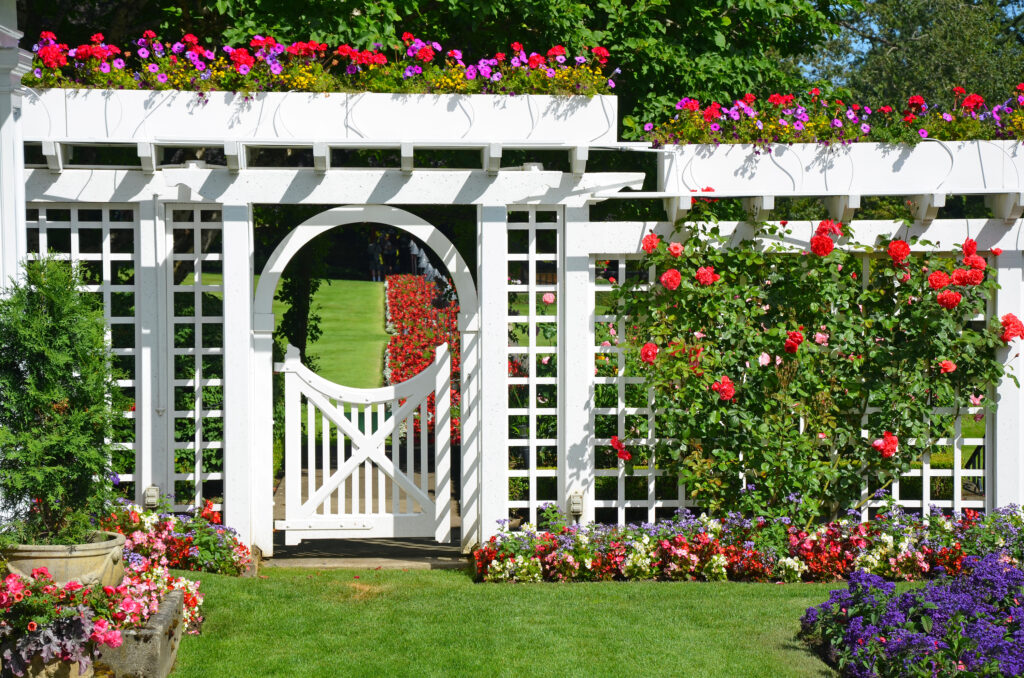
Just because your garden is outdoors, doesn’t mean it can’t feel private! There are plenty of ways you can improve your garden’s privacy features, from privacy screens to natural options like climbing plants and hedges. Speak to a garden landscaper today to find out more…


